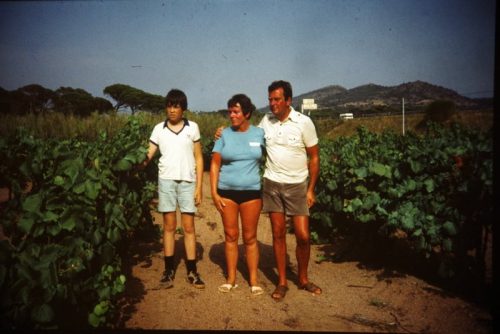
In many classic wine-producing countries it used to be normal to visit a winery and buy wine directly from the tank, filling up your own container. This is a good thing: many wines don’t need to be bottled
How did you spend your childhood holidays? I have three siblings, and the four of us were taken camping every year by my parents. They were quite brave: the first time, my twin sister Anne and I were just over four, and my younger brother Arthur was fresh out, and my sister Hester was somewhere in between. And they took us camping to France. The first year we went to somewhere on the Atlantic coast and it rained solidly for two weeks, with only the occasional glimpse of the sun. 8mm home movies show flickering moving images of us all in coats, avoiding rain showers, and playing with the snails who were enjoying the weather.
My parents learned the lesson, and in subsequent years headed to the Mediterranean coast. Provence was next, but then there’s always the risk of the Mistral, and getting sand blasted on a beach isn’t so much fun. And even then, back in the late 1970s, it was busy as during August. After a few years they settled on Spain; first, Tarragona, and then a campsite near Valencia that was to become a perennial favourite. When my father went freelance in the early 1980s, the holidays became longer. One mammoth trip was six weeks, our entire school summer break. It was hot and sunny, and because it was even hotter inside the tent, we were outside all the time. My parents loved to relax on the beach and drink wine. And then, in the evenings, cook and drink wine. And they frequently visited bodegas in town where they’d take their own containers and fill them with inexpensive wine straight from the tank.
In many wine regions, buying en vrac like this (to use the French term) was the norm. It made sense: why bottle a wine when it is to be consumed in the very near future? It’s a waste of glass, and there’s also something wonderfully visceral and immediate about filling your own vessel with an honest, inexpensive wine straight from tank. The wine doesn’t have to taste all that nice: this isn’t the point. It is a daily staple, usually relatively light in alcohol and thirst quenching and digestible and true and affordable. Wine for the people.
There are many wines that really should never see a bottle. Of course, if you live some way from a wine region, the wine must be transported and kept in good condition during this journey. But there are alternatives to bottles, and I’m all for them, whether it is bag in box or bladder pack, or the new thing in restaurants: wine on tap. Two wine on tap systems are being widely used in the on trade: Petainer and Key Keg. They are both fabulous. The restaurant can either pour by the glass from the tap, or use the tap to top up carafes or bottles (which are then washed and re-used). It saves a lot of glass, and the wine is always in good condition. I welcome moves away from selling inexpensive wine in bottle. It really isn’t necessary.
2 Comments on For most wines, glass bottles make no sense



We still do this often in Alentejo, our region of Portugal. We bring a garrafao, a glass jug covered in wicker or plastic, to the cellar door and have it filled. The wines are simple, pleasant, every day wines that we drink with many meals. It’s something Portugal still does very well — this style of wine — and the American in me still can’t believe we only pay a few euros:)
Good point.
When I was in college in Northern California in the 60s there was a small winery run by an Italian family that sold their wine this way. You brought in your jug and they filled it up.
And, of course, nowadays the several brewpubs in my town sell beer this way.
I do feel strongly that the advocates of recycling have led us astray for the last 4 or 5 decades and we have, as a consequence, handled packaging products of all kinds incorrectly. I don’t know how viable reuse is but those items which can’t be reused should be biodegradable.